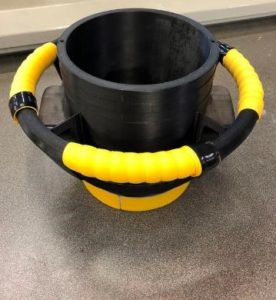One of the worlds biggest independent and privately-owned aerospace and defence companies is Marshall Aerospace and Defence Group. They are always pushing their limits to build complex, accurate, lightweight and functional parts that are also cost-effective. Naturally, additive manufacturing is becoming a perfect fit for their manufacturing process and Marshall is now using 3D printed parts from Stratasys that are built-to-fly with fused deposition modeling (FDM) technology.
Additive manufacturing progressively becoming a commonly used & “go-to” application as designers and manufacturers are looking to increase the reliability and performance of intricate and flight-ready parts while working to keep costs down. Additive manufacturing technology is becoming quickly adopted and readily used as it allows for faster design iterations, decision-making and responses to market advancements- this enables designers and manufacturers to get fixtures and flight-ready parts from idea to production in a portion of the time. In addition to this, because we’re dealing with aerospace, all materials must also adhere to strict certification guidelines and qualifications by the industry.
Stratasys Additive Manufacturing Technology
Produces Flight-Ready PartsIn this video, discover how certified aircraft interior solutions from Stratasys printed on Fortus 3D Printers are enabling aerospace manufacturers to reduce weight and costs associated with production.
For Marshall, 3D printing with Stratasys is a perfect fit. The team at Marshall Aerospace is integrating additive manufacturing when producing flight-ready parts for many of its civil, business and military aircraft- 3D printing is supporting Marshall by providing them with tailored & cost-effective ground-running equipment, in comparison to the traditional aluminum alternatives. Furthermore, the team is incorporating Stratasys technology into 3D printed ductwork flying on heavily modified aircraft- in addition to key aircraft interior elements.
The manufacturer utilizes the Stratasys Fortus 450mc 3D Printer and ULTEM™ 9085 resin as the major players in their manufacturing and prototyping ecosystems. The FDM machine used for advanced prototyping and production- it is meant to 3D print parts in requirements-driven and complex environments, such as automotive and aerospace industries.

ULTEM resin is high-performance, certified FDM thermoplastic-providing manufacturers the ability to 3D print production-grade parts for high-strength, lightweight and certified applications. Because ULTEM materials are advanced, it ensures that parts made also meet the required smoke, flame and toxicity properties needed for aircraft interiors.
Additive manufacturing has also been imperative for Marshall to test complex designs before shifting to expensive production- this also includes the production of their key ducting adaptor prototype. By using additive manufacturing to 3D print a prototype for this specific application, Marshal discovered great cost savings in addition to a 63% reduction in the overall weight of the part.
The Fortus machine allowed the Marshall Aerospace team to 3D print the prototype in ASA material before committing to costly investments in aluminium options during machining. This series of steps enabled the team to develop a working prototype with complex component-in the end this proved that piece could be printed in Nyon 12 instead of other more expensive options.
Chris Botting, Materials, Processes and Additive Manufacturing Engineer at Marshall Aerospace explains that the company trusts in FDM technology:
“FDM technology has altered the way we work, and the aerospace-grade 3D printers and materials enable us to meet our increasing aggressive deadlines and complex manufacturing requirements. In the future, there’s no doubt that 3D printing will continue to have a significant impact in the way we design and manufacture in our business.”
Marshall is one of many aerospace companies across the world encouraging businesses to soar with the use of additive manufacturing.
